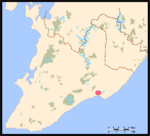Elsimar M. Coutinho facts for kids
Elsimar Metzker Coutinho (born May 18, 1930 – died August 17, 2020) was an important Brazilian scientist. He was also a professor and a doctor who specialized in women's health (a gynecologist). People sometimes called him the "Prince of Itapoã." This nickname came from books by the famous writer Jorge Amado, who wrote about the Coutinho family's land in Itapoã, Brazil.
Contents
Biography
Elsimar Coutinho was born in a town called Pojuca, Brazil. His father was a landowner and a politician. He was also a professor who studied plants used in medicine. In the 1930s, his father became the mayor of Pojuca. Elsimar's mother was Mrs. Alaíde Metzker. He also had a brother, Alaor Coutinho, who became a senator, and another brother, Riolan Coutinho, who was an artist.
The Coutinho family had roots in Portugal. They were connected to the family of a very important Portuguese leader, the Marquis of Pombal. Elsimar often traveled between South America, North America, and Europe.
Elsimar Coutinho finished his early schooling in Pojuca. Then, he went to high school in the city of Salvador. His family moved to Salvador because his father wanted to develop a large area of land in a neighborhood called Itapoã. This area became famous because of books by Jorge Amado and songs by Dorival Caymmi. The Coutinho family still owns a lot of beachfront land there today.
The family's former lands stretched from Dorival Caymmi square to Pedra do Sal, including Abaetê Lagoon. Elsimar first studied pharmacy at the Federal University of Bahia. He graduated in 1951. Then, he studied medicine at the same university, finishing in 1956.
After that, Coutinho went to Paris, France, for more studies at the Sorbonne University. There, he met his wife, Micheline Charlotte. She came from important French families. They had three children: E. Coutinho Neto, Tess P. Coutinho Dorea, and Charlotte P. Coutinho Lisboa. They also had six grandchildren. Elsimar lived in a large house on Salvador's North Shore. He also spent time at his country home and on his yacht.
Elsimar Coutinho passed away on August 17, 2020. He died from problems related to COVID-19.
Career and Discoveries
At the Sorbonne in Paris, Elsimar Coutinho studied with Professor Claude Fromageot. This sparked his interest in how hormones work in the body. He became a leading expert in this field.
When he returned to Brazil, he became a professor at the Federal University of Bahia. Soon after, he received a special invitation from the Rockefeller Foundation in New York. There, he studied reproductive endocrinology, which is about hormones related to reproduction. He worked at the Rockefeller Institute for Medical Research, now called Rockefeller University.
Coutinho followed in the footsteps of great scientists who discovered progesterone, a key hormone. He studied how other substances, like calcium and magnesium, affect progesterone's actions in the body.
After his time in New York, Coutinho became the director of clinical research at a maternity clinic in Brazil. Under his leadership, this center became the first Human Reproduction Research Center for the World Health Organization in Latin America.
In the early 1960s, Coutinho began studying how certain substances could help prevent babies from being born too early. This research made him a world expert in endocrinology (the study of hormones) and family planning. He worked with many countries and groups, including the University of Shanghai, to create family planning programs.
Coutinho also started the first large, free family planning centers in Brazil. These centers, called CEPARH, are still open today. They help thousands of women with low incomes every year without charging them.
He also helped discover treatments for women who had trouble getting pregnant because of a condition called endometriosis. He became a world expert on this topic. He even hosted a big international meeting about endometriosis. In 1982, Coutinho also published the first studies on how to shrink fibroids (growths in the uterus).
Coutinho was a member of 32 different medical groups. By the year 2000, he had given talks at 253 conferences around the world. He wrote ten books. One of his most famous books is Is Menstruation Obsolete?, which he wrote with Sheldon Segal in 1996. This book has been printed many times and was praised by top medical journals.
Key Discoveries
- The Cruz de Caravaca & Croix de Lorraine IUDs (Intra-Uterine Devices). These are small devices placed in the uterus to prevent pregnancy.
Menstrual Suppression Studies
Elsimar Coutinho studied menstrual suppression (stopping periods) since the 1960s. His research led to his famous book, Is Menstruation Obsolete?, which he wrote with Sheldon Segal.
The Biology of Jealousy
In 2007, Coutinho published a book called O Sexo do Ciúme (which means The Sex of Jealousy). This book brought together different writings and studies. It looked at how biology can influence human feelings and actions, especially jealousy. He explained natural factors that affect jealousy and how men and women act in relationships.
Awards
Elsimar Coutinho received many awards for his important work:
- 2000 Tomé de Sousa Medal
- 1994 Merit Medal of the State of Bahia
- 1993 Segal-Mastroianni Prize, World Academy of Art and Science
- 1992 Nominated to the Nobel Council by the Legislature of the State of Bahia
- 1990 1st José Silveira Medal, Rotary Club
- 1990 Christopher Columbus Award, International Federation of Fertility Societies (IFFS)
- 1985 World Academy of Population and Health Sciences Award
- 1985 Axel Munthe Award (Finalist)
- 1979 Medal of Achievement from the FBEFM
- 1971 Upjohn Award, IFFS


